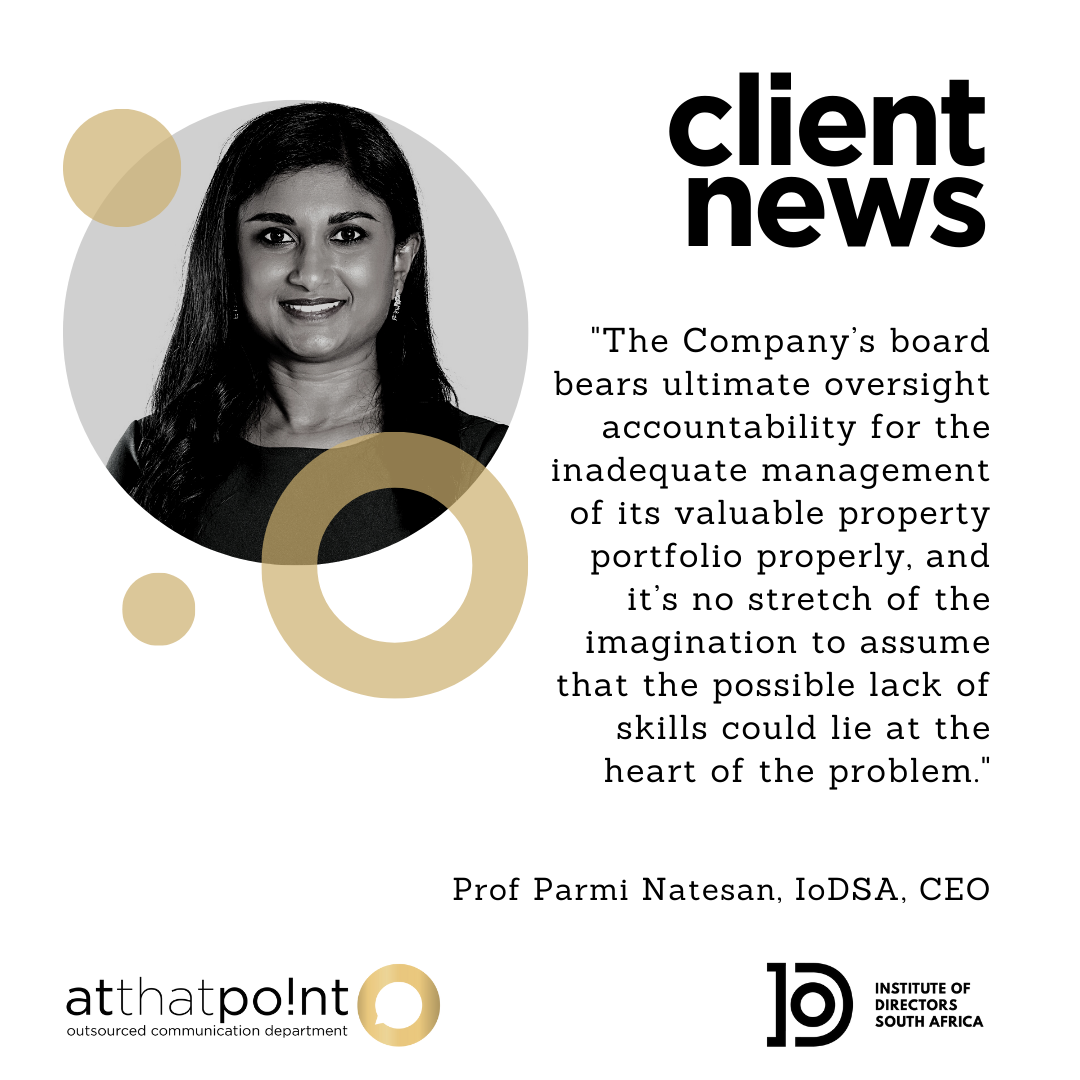 A slew of recent media reports indicate that the Johannesburg Property Company has appointed several individuals to its board who, on the face of it, do not possess the necessary skills to govern a significant municipal entity with a property portfolio worth an estimated R8.7 billion. These appointments, which are reported to include a receptionist, a cashier and a person without matric, appear to have been made unilaterally by the MMC for Economic Development. “The Johannesburg Property Company manages 30 000 properties, many of which have reportedly been hijacked—in fact, the devastating Albert Street fire that claimed 77 lives was apparently one of them. The Company’s board bears ultimate oversight accountability for the inadequate management of its valuable property portfolio properly, and it’s no stretch of the imagination to assume that the possible lack of skills could lie at the heart of the problem,” says Professor Parmi Natesan, CEO of the Institute of Directors in South Africa (IoDSA). “Media reports also suggest that the MMC treats the company as a private fiefdom to which political cadres are appointed, based presumably on their loyalty and political importance, and not necessarily their skills as directors. The sad state of municipal entities across the city, and indeed the country, shows the devastating consequences of flouting robust nomination processes for board and senior executive positions.” The IoDSA has repeatedly pointed out that public sector entities face particular challenges when it comes to appointing competent boards. The state, as the sole shareholder, has not been seen to follow best practice in this regard. According to King IV, directors should have the correct mix of skills and experience to discharge their legal duties. A robust and transparent nomination process that includes in-depth vetting of candidates should be followed, says Professor Natesan. “Without such a nomination process, the board members can hardly act competently and independently in order to fulfil their legal duties, which are to the company and not to whoever appointed them,” Professor Natesan says. “I wonder if these directors realise that they can be held personally liable for any untoward decisions they make. Modern-day directors need not only business and sector skills and experience, but also finely honed governance expertise.” The performance of local government generally, including municipal entities like the Johannesburg Property Company, has a direct bearing on service delivery and thus on the most vulnerable sectors of society. The Auditor-General’s Consolidated General Report on Local Government Audit Outcomes 2021-22, an annual report on audit outcomes for entities governed by the Municipal Finance Management Act, notes that fruitless and wasteful expenditure continues to balloon. It doubled in 2021-22 to R4.74 billion, plus an estimated R5.19 billion in financial loss from non-compliance and fraud. It is clearly imperative that municipalities and municipal entities are properly governed, and the Auditor-General highlights the need for competent people to be appointed to municipal structures, and for governance to be strengthened. “The Johannesburg Property Company is just one of many municipal entities that are perceived to be – and often are – underperforming, with one of the reasons for that underperformance reasonably assumed to be that board appointments are not necessarily made with the entity’s needs in mind,” she argues. “These entities need proper governance and strong oversight or they are likely to fail to do their jobs, with disastrous consequences for society and our country.” ENDS MEDIA CONTACT: Idéle Prinsloo, [email protected], 082 573 9219, www.atthatpoint.co.za For more information on the IoDSA please visit: Website: www.iodsa.co.za Twitter: @The_IoDSA LinkedIn: Institute of Directors in South Africa Company Page Facebook: Institute of Directors South Africa
0 Comments
Much has changed since King IV came into effect on 1 April 2017 but, says the chair of the King Committee, Ansie Ramalho, its principles and practices are expressed at a sufficiently high level of generality to empower boards to apply them in the current circumstances.
“There have been a number of developments in the past few years that will influence how organisations are led and governed over the next decade and beyond,” says Ramalho. “We are currently reflecting on these developments and what they mean for corporate governance, and whether additional clarity or guidance might be required. At this stage, though, we believe that any update of King IV would be premature—especially given the ongoing developments relating to global reporting requirements and standards, as well as the pending Companies Act Amendment Bill.” One of the developments currently being debated by the King Committee is recent rapid advances in artificial intelligence and technology generally, which raise significant, complex risks and ethical issues. At a global level, regulations and standards that deal with sustainability disclosure by companies are also being introduced at an unprecedented speed. Environmental, social and governance (ESG) issues are re-emphasising the focus on the organisation’s purpose and are affecting corporate reporting and disclosure significantly. Human capital governance has become more complex as a new generation of employees enters the corporate world with a novel set of expectations, while the way organisations are run has changed significantly as working habits change in response to the COVID-19 lockdowns. Board composition is also a developing area, with consideration being given to greater stakeholder representation or other suitable mechanisms to enrich decision-making. In the South African context, the Companies Act Amendment Bill looks set to introduce significant amendments to the current Act. The Bill was issued for public comment in 2021, but no final version has yet appeared. However, its proposed provisions for strengthening oversight by social and ethics committees of companies’ social and environmental performance, its introduction of accountability mechanisms for the wage gap, and shareholder voting on remuneration are all clear signals of the prevailing mood, as is the cautionary statement in the Bill’s explanatory memorandum that regulation to include employees in governance structures is to follow. In the wake of the Zondo reports, the country’s greylisting and current geo-political concerns, South African organisations are particularly affected by governance issues relating to corruption, including money laundering, terrorism, and transparency regarding the true owners of a company. King IV unequivocally maintains that operating context needs to be accounted for in strategy development, risk management, performance and reward systems and reporting, but the balancing act is becoming increasingly difficult, says Ramalho. Businesses are increasingly being expected not only to mitigate external risks but to contribute proactively to not only the economies in which they operate but also the health of society and the planet. The move to incorporate ESG factors into investment decisions shows that so-called “non-financial” factors ultimately have financial consequences. Investors are increasingly taking into account the context in which a company operates. This balancing act between financial and non-financial factors is particularly difficult for South African companies. In the interests of their own survival, they are increasingly having to step into gaps created by the government’s inability to deliver key services. To attract investment, South African companies will need to demonstrate that they are able to survive in an overall environment which is fraught with threats and vulnerabilities, Ramalho believes. “I would like to assure all our stakeholders that the King Committee is keeping abreast of the evolving corporate governance trends and has been considering their potential impact on the King IV Report. While any formal update is premature at this stage, we stand ready to offer South African organisations any further insights or guidance that may be required as these trends unfold. We also envisage that this process will include stakeholder engagement,” she says. “The King Committee reaffirms its belief that corporate governance does not exist for its own sake, but as a way of building resilient and healthy companies that are fit for this complex operating context.” ENDS MEDIA CONTACT: Stephné du Toit, [email protected], 084 587 9933, www.atthatpoint.co.za For more information on the IoDSA please visit: Website: www.iodsa.co.za Twitter: @The_IoDSA LinkedIn: Institute of Directors South Africa Company Page Facebook: Institute of Directors South Africa 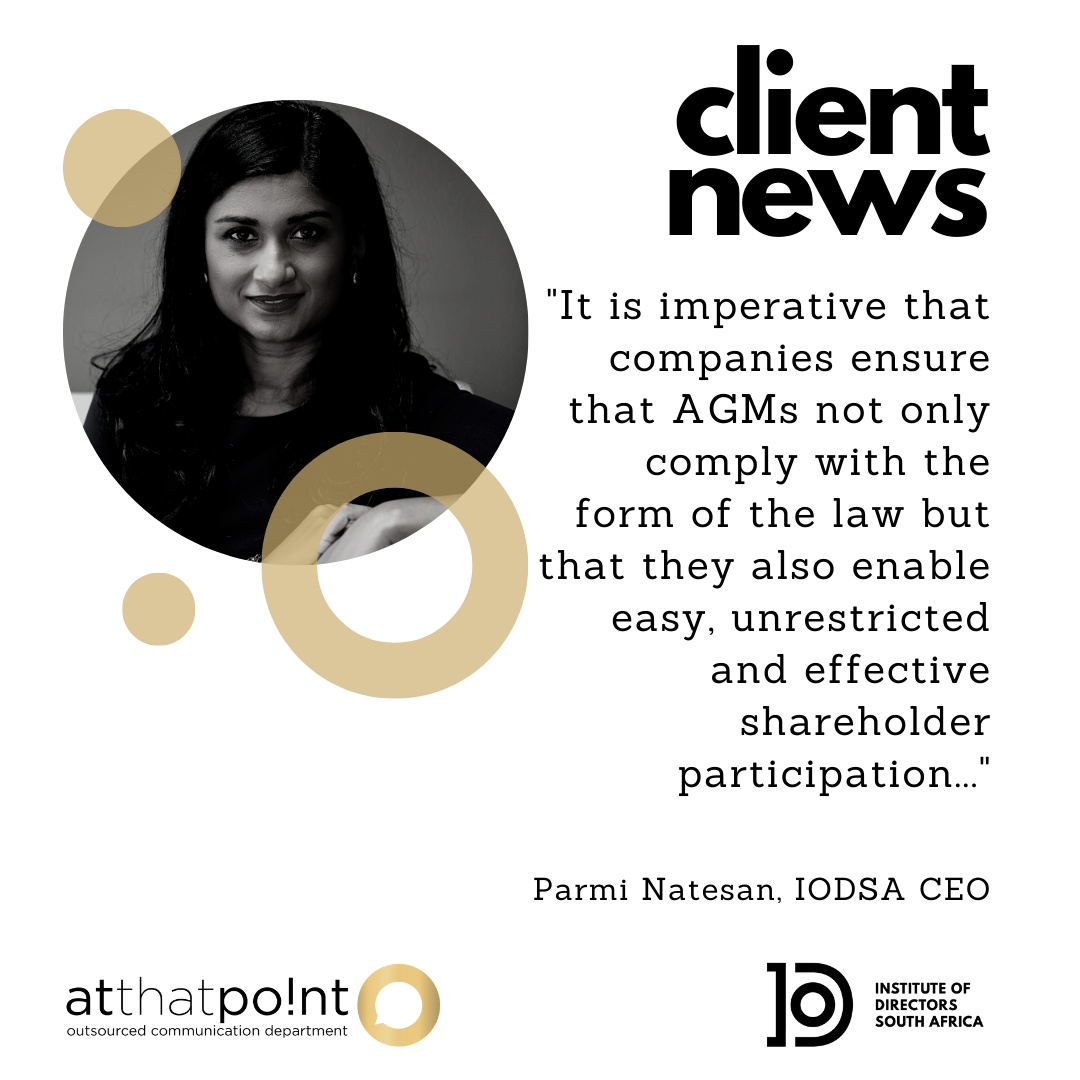 An Annual General Meeting (AGM) of a company that restricts shareholders to use only text-based communication does not constitute an AGM for the purposes of the Companies Act 71 of 2008. This is according to the legal opinion of the Companies and Intellectual Property Commission (CIPC) on holding AGMs via electronic means. According to the opinion, a company holding an AGM with shareholders attending online must allow those shareholders to verbally ask questions in real-time and without an intermediary. This aligns with the IoDSA’s previous comments on this matter, in which we noted that whilst the section does not specifically state that verbal communication is required, the spirit of the section should be interpreted to allow sufficient engagement at the AGM, as would have taken place had the meeting taken place in-person. The Institute of Directors in South Africa (IoDSA) welcomes this clarification from the CIPC. “If you consider the Companies Act and King IV in substance over form, shareholders should have a right to be heard at an AGMs,” says Parmi Natesan, CEO of the IoDSA. “It is imperative that companies ensure that AGMs not only comply with the form of the law but that they also enable easy, unrestricted and effective shareholder participation during the meetings, in substance.” “Whilst engagement between companies and shareholders can take place at any time, the AGM is the key point of formal engagement and the main opportunity for shareholders to exercise their voting rights, raise concerns and ask questions,” explains Natesan. A key, but often neglected voting resolution at AGMs is the appointment of directors. Shareholders have the legal right and obligation to appoint directors to oversee the company. Those directors, in turn, have a legal obligation to act in the company’s best interests and can be held personally liable if they do not do so. A big emphasis at AGMs should therefore be ensuring that the right people are appointed to the board and that they are held properly accountable. Shareholders need to be confident that they are appointing directors in whom they have full trust. They then need to allow these directors to exercise their discretion in the fulfilment of their duties while holding those directors accountable. They should also consider when the removal of a director is appropriate as this is another powerful and important tool that a shareholder has to protect the company’s interests. In relation to the AGM resolution on director appointments, questions asked should therefore be aimed at determining whether board members have the necessary knowledge, skills, experience, independence, personal competencies, track record and even sufficient time available to effectively serve on the board. “In summary, shareholders now have confirmation of their right to be heard at virtual AGMs and are encouraged to use their voice effectively in exercising their voting rights and holding the directors accountable,” says Natesan. ENDS MEDIA CONTACT: Stephné du Toit, [email protected], 084 587 9933, www.atthatpoint.co.za For more information on the IoDSA please visit: Website: www.iodsa.co.za Twitter: @The_IoDSA LinkedIn: Institute of Directors South Africa Company Page Facebook: Institute of Directors South Afric  Just days after Mpho Phalaatse was removed as Johannesburg’s mayor, a letter to all municipal entities surfaced on social media, in which the Acting City Manager of Johannesburg instructs the boards of municipal entities to cease holding any “strategic sessions, including the [sic] Board and Sub-Committee meetings” until further notice. Boards may seek permission to hold meetings to consider any critical reports. All strategic and programme management decisions are specifically placed in abeyance, and any decisions taken since September 2022 are also put on ice. “If this letter is indeed legitimate, it’s hard not to see this move as a departure from good governance. The content of the letter also raises once again all the accountability issues that the IoDSA has consistently highlighted in relation to state- and municipality-owned entities,” says Parmi Natesan, CEO, Institute of Directors in South Africa (IoDSA). “The shareholder may appoint the boards of these entities, but once appointed these boards have a legal duty to fulfil their obligations as set out in the relevant legislation and in the King Report, and to act in the best interests of the entity.” The IoDSA has repeatedly pointed out that many of the issues that plague state- and municipality-owned entities can be traced back to the improper exercise of power by the shareholder. By usurping what should properly be the functions of the board, the shareholder makes it impossible for the board to be held accountable, or for the board to hold management accountable. “Boards are supposed to act independently, but this letter clearly demonstrates that, in the City of Johannesburg at least, they are being prevented from doing so,” she says. Ms Natesan goes on to point out that forbidding the boards of the municipal entities to meet means that they cannot fulfil their duties and exercise oversight properly. “Municipalities are commonly known for lack of service delivery, as well as fruitless and wasteful expenditure, so preventing boards and audit committees, from meeting and thus exercising oversight, will potentially open the door to even more of the same,” she comments. It is questionable whether any appointed board can be prevented from discharging its legal duties. Time will tell whether such action will stand up to scrutiny and legal challenge. “King IV makes it clear that boards should hold as many meetings as necessary to discharge their obligations, so presumably they cannot be prevented from doing that,” she concludes. “This gross interference in the board’s exercise of its governance function is a terrible way for the City’s new administration to begin. The IoDSA urges the new mayor and his executive to take speedy action to confirm their adherence to the principles of good governance as outlined in the legislation and King IV.” ENDS MEDIA CONTACT: Stephné du Toit, [email protected], 084 587 9933, www.atthatpoint.co.za For more information on the IoDSA please visit: Website: www.iodsa.co.za Twitter: @The_IoDSA LinkedIn: Institute of Directors South Africa Company Page Facebook: Institute of Directors South Africa 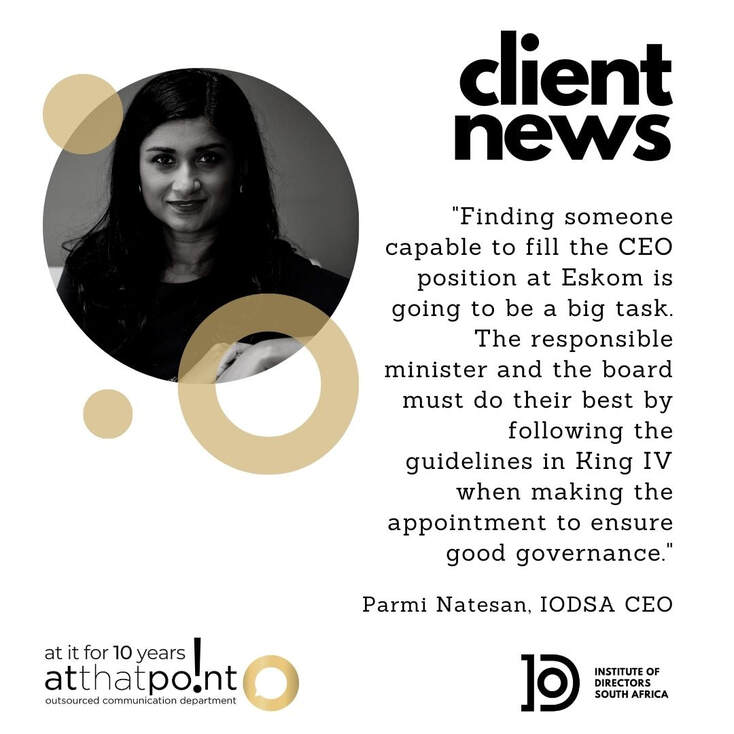 The current crisis at Eskom has a number of governance lessons for South Africa, one of which is the vital importance of proper succession planning for key senior positions, says Parmi Natesan, CEO of the Institute of Directors in South Africa (IoDSA). “The imminent departure of both the CEO and COO of Eskom in the next few months, with no obvious successors being communicated, raises concerns,” she says. “Now is really not the time for the two top positions—and many other senior management ones—to be vacant. In fact, Ms Natesan continues, the Eskom Statement on 14 December 2022 makes it clear that Mr De Ruyter’s agreement to stay on beyond the required 30-day notice period is welcome because there seems to be no planned successor for his position. The statement quotes the board chair as follows: “Mr De Ruyter has agreed to stay for an additional period beyond the stipulated 30-days’ notice to ensure continuity while we urgently embark on a search for his successor”. It remains to be seen whether there are plans in place for a succession to the COO, Jan Oberholzer, who is due to retire in April—a month after Mr De Ruyter leaves—and it is also unclear as to whether he will remain available to hand-over to a successor when one is appointed. King IV specifically states that the board should satisfy itself that there is succession planning for the CEO and other executive positions in place to provide continuity of executive leadership. Succession planning should be reviewed periodically and should provide for both succession in emergency situations and succession over the longer term. This should include the identification, mentorship and development of future candidates. The IoDSA has repeatedly said that the way the CEOs of key state-owned enterprises have been appointed were not in line with good governance as outlined in King IV. Too often, the powerful single shareholder bypasses the board in making the appointment. This leads to problems because the CEO is seen as a representative of the shareholder, and thus sometimes does not feel accountable to the board. Skewed reporting lines set the board and executive management up for conflict, with bad results for the organisation. “Finding someone capable to fill the CEO position at Eskom is going to be a big task. The responsible minister and the board must do their best by following the guidelines in King IV when making the appointment to ensure good governance,” she concludes. “Good governance is the foundation of good organisational performance—and the converse is also true.” ENDS MEDIA CONTACT: Stephné du Toit, [email protected], 084 587 9933, www.atthatpoint.co.za For more information on the IoDSA please visit: Website: www.iodsa.co.za Twitter: @The_IoDSA LinkedIn: Institute of Directors South Africa Company Page Facebook: Institute of Directors South Africa 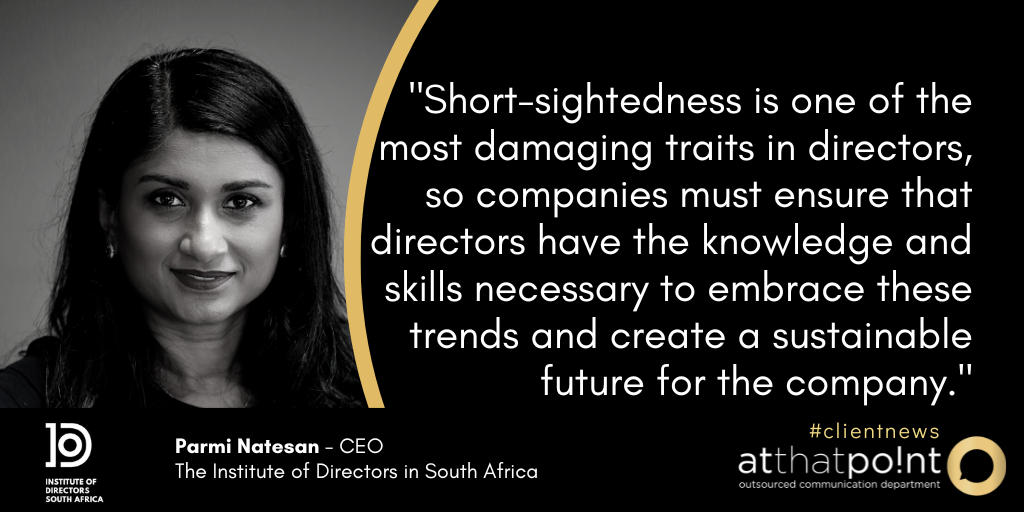 The Institute of Directors in South Africa (IoDSA) lays out five key trends for boards and directors to focus on in 2023. Parmi Natesan, CEO of the IoDSA argues that boards need to begin planning their agendas for 2023 to ensure they are on top of these trends—and that their members have the requisite skills to fulfil their duties. “Short-sightedness is one of the most damaging traits in directors, so companies must ensure that directors have the knowledge and skills necessary to embrace these trends and create a sustainable future for the company,” she says. The five disruptive trends are: Less time, more pressure. Businesses have to respond fast to a rapidly changing global environment that is increasingly automated - directors are under increasing pressure to take important decisions rapidly. The chair’s role becomes even more critical in striking a balance between facilitating an inclusive exchange of views while preventing unprepared directors or individual agendas to hijack or prolong the board’s deliberations. By the same token, directors must be properly prepared to make decisions on agenda items. Less paper, more AI. Boards will specifically need to acquire the skills to interpret real-time data accurately in order to incorporate it into their decision-making process. They can no longer simply base their deliberations on the board pack but will need to ensure that artificial intelligence (AI) is effectively used to process large amounts of data to deliver relevant insights. In a similar vein, directors will need to allocate resources to streamline business processes within the company using AI and other Fourth Industrial Revolution technologies. Less focus on operational issues, more oversight. The traditional view that extensive operational or managerial experience makes for a good director must now be discarded once and for all—directors need a distinct knowledge base and skill set. “Continuing learning is vital. The IoDSA’s advice is to plan training topics into the meeting calendar for the year and, if necessary, integrate training sessions into the board’s or committee’s meeting agenda,” Ms Natesan says. “The IoDSA can help by providing this phased and structured learning via two-hour snapshot training sessions.” Less stability, more agility. Today’s world is volatile, uncertain, complex and ambiguous (VUCA), with economic and geopolitical issues more intertwined and harder to interpret than ever. Long and complex supply chains also expose companies to contingent risks and thus require extensive planning to ensure alternatives are in place. In this VUCA world, the ability to respond rapidly and strategically is critical. Less greed, more green. Environmental issues, including but not limited to climate change, should be prominent on the board agenda for a multitude of reasons. Directors need to have the skills not only to understand these complex issues but also how to measure and report credibly on the company’s progress in meeting its environmental targets. ENDS MEDIA CONTACT: Stephné du Toit, [email protected], 084 587 9933, www.atthatpoint.co.za For more information on the IoDSA please visit: Website: www.iodsa.co.za Twitter: @The_IoDSA LinkedIn: Institute of Directors South Africa Company Page Facebook: Institute of Directors South Africa 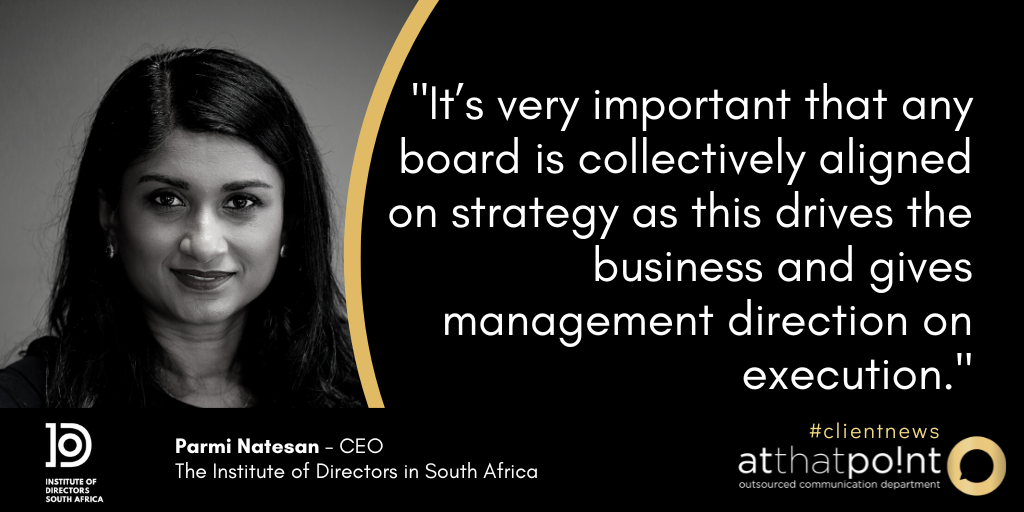 Events at Huge Group, as reported in the media, hold important governance lessons for all organisations, says Parmi Natesan, CEO: the Institute of Directors in South Africa (IoDSA). Reports stated that at a recent board meeting, the chairman and two other directors resigned with immediate effect, apparently over disagreements relating to corporate strategy. “It’s very important that any board is collectively aligned on strategy as this drives the business and gives management direction on execution. It’s therefore not surprising that vehement disagreement on strategy would lead to a parting of the ways,” comments Ms Natesan. “Another obvious takeaway is that the departure of three experienced non-executive directors at once is a major loss of institutional knowledge for any company, something that it will take a long time to recover from—a well-thought-out board succession plan is clearly vital.” When the news of the resignations broke, the simultaneous appointment of three substitute directors was also announced. On the one hand, this may indicate that a succession plan was indeed in place, or it may have been just quick action, Ms Natesan believes. “Whilst the speed of finding replacements is to be applauded, one has to consider whether this was a missed opportunity for better demographic diversification on the board. After the new appointments, the board’s composition remains all male and majority white—this despite both the JSE Listings Requirements and King IV referring to targets and reporting on racial and gender diversity on boards,” she says. There is widespread agreement that a diverse board does more than tick boxes and create a good impression. For example, 86% of respondents in a recent research survey believe that board diversity contributes to better board performance, while 77% link board diversity and improved corporate performance. Overall, 73% of respondents noted that their company was taking action to increase board diversity. The research also indicates that investors are starting to ask questions about board diversity. Globally, just over a third (35%) of investors request such information, with this question most likely to be asked in Europe (43%). Investors are most likely to ask about boardroom diversity in relation to mega-cap (71%) and large cap (57%) companies.[1] “Common sense tells us that the more lenses through which a board can examine the world, the better. There’s also interesting research that links a company’s financial performance and gender and skill diversity on the board,”[2]concludes Ms Natesan. “This is a complex topic, but it’s clear that boards need to investigate it fully and, most importantly, have a succession plan that reflects their conclusions and resulting diversity goals.” [1] Corporate Secretary, “Boardroom diversity: From disclosure to recruitment”, available at https://content.corporatesecretary.com/story/cs-boardroom-diversity-from-disclosure-to-recruitment/page/1. [2] Khaled Hosny, Adel Elgharbawy, “Board diversity and financial performance: empirical evidence from the United Kingdom”, Accounting Research Journal (17 June 2022), available at https://www.emerald.com/insight/content/doi/10.1108/ARJ-02-2020-0037/full/html. ENDS MEDIA CONTACT: Stephné du Toit, [email protected], 084 587 9933, www.atthatpoint.co.za For more information on the IoDSA please visit: Website: www.iodsa.co.za Twitter: @The_IoDSA LinkedIn: Institute of Directors South Africa Company Page Facebook: Institute of Directors South Africa UCT Council reports demonstrate the importance of following good governance practices—IoDSA11/10/2022 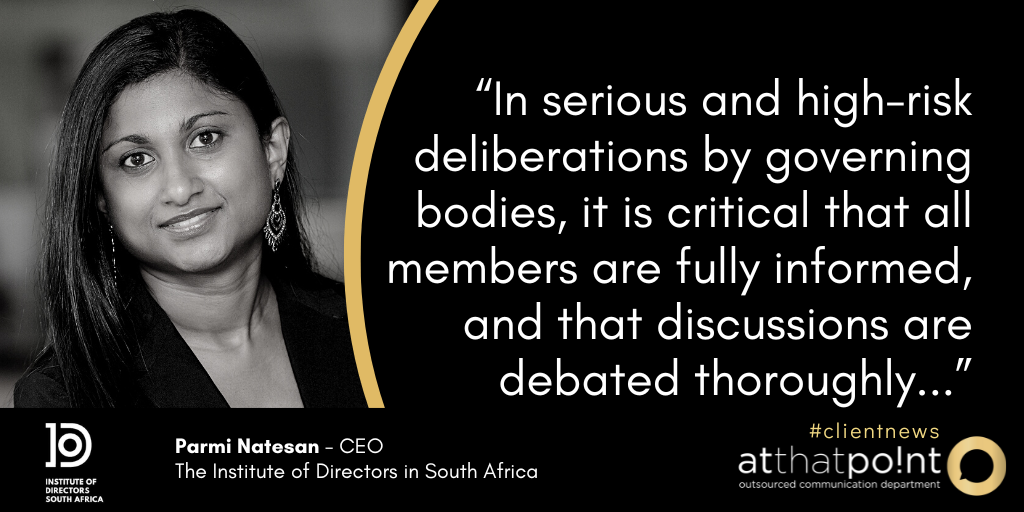 Reports of the unfolding developments at the University of Cape Town suggest deviations from governance best practice, says the Institute of Directors in South Africa (IoDSA). These include that the UCT Council “was split down the middle about the need for an independent judicial commission of enquiry into allegations of mismanagement and poor corporate governance”,[1] and that potentially implicated members of the Council were allowed to cast a vote in the matter. A key principle of good governance is that individuals on governing bodies need to be aware of conflicts of interest, and declare them upfront. Conflicted governing-body members should then recuse themselves from any business or decisions that relate to their conflict. King IV makes this very clear. Principle 1 of King IV is that “The governing body should lead ethically and effectively”, with Recommended Practice 1 (a)(ii) reading: “Members of the governing body should avoid conflicts of interest. In cases where a conflict cannot be avoided, it should be disclosed to the governing body in full at the earliest opportunity, and then proactively managed as determined by the governing body and subject to legal provisions.” An IoDSA guidance note goes on to advise that “A key function of a chair is to manage conflicts of interest. It is not sufficient merely to table a register of interests. All internal and external legal requirements must be met. The chair must ask affected directors to recuse themselves from discussions and decisions in which they have a conflict unless they are requested to provide specific input, in which event they should not be party to the decision.” In this instance, if the reports of potentially implicated Council members being allowed to vote on a matter that concerned them intimately are true, this would constitute a departure from governance best practice. Certainly, a large section of the Council seems to believe that such an unethical decision was taken, and has gone public with its disagreement. This in turn is attracting unfavourable media attention, and may imperil the ability of the governing body to function effectively in the future. Whatever the rights and wrongs, the very existence of such a profound split in a governing body on such an important matter is also a concern. “In serious and high-risk deliberations by governing bodies, it is critical that all members are fully informed, and that discussions are debated thoroughly and ultimately culminate in a decision that has the backing of the entirety, or at least the vast majority, of the governing body which is collectively responsible,” concludes Ms Natesan. [1] Andriaan Basson and Marvin Charles, “UCT crisis deepens as 13 top council members slam ‘irregular, flawed’ meeting”, News 24 (7 October 2022), available at https://www.news24.com/news24/southafrica/news/breaking-uct-crisis-deepens-as-13-top-council-members-slam-irregular-flawed-meeting-20221007. ENDS MEDIA CONTACT: Stephné du Toit, [email protected], 084 587 9933, www.atthatpoint.co.za For more information on the IoDSA please visit: Website: www.iodsa.co.za Twitter: @The_IoDSA LinkedIn: Institute of Directors South Africa Company Page Facebook: Institute of Directors South Afric 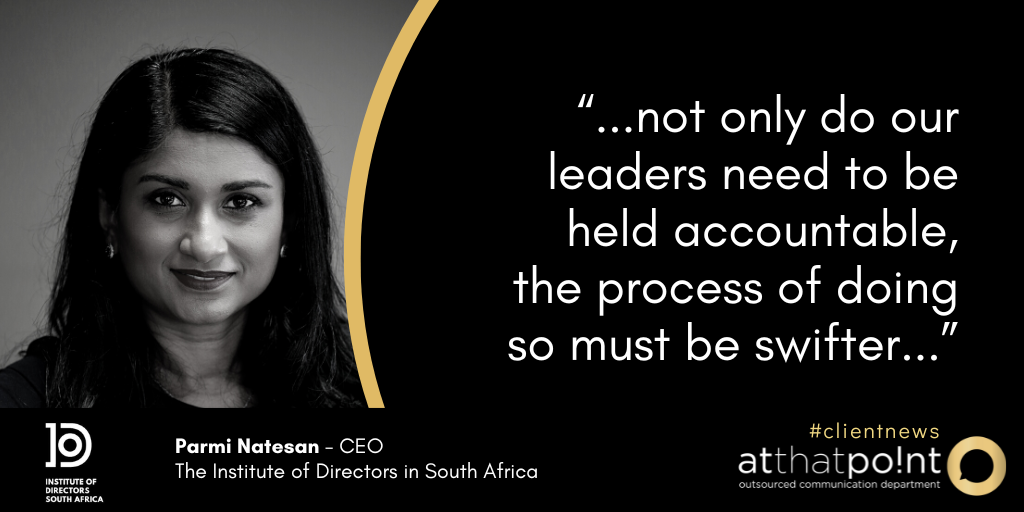 In its final report, the Zondo Commission repeatedly comments that directors of the various captured state entities have not been properly held accountable for the massive damage they have caused to the organisations they were supposed to serve, and thus indirectly to the country as a whole. The Institute of Directors in South Africa (IoDSA) strongly endorses these observations. “The issue of director accountability is one that the IoDSA has been raising in public forums for a number of years. In a letter to the Commission in September 2021, we specifically raised the point that not only do our leaders need to be held accountable, the process of doing so must be swifter,” says Parmi Natesan, CEO, IoDSA. “We recommended the establishment of a constitutional means of alternate dispute resolution to facilitate prompt and effective consequence management both for transgressing directors and those charged with exercising oversight over them.” In its final report, the Zondo Commission maintains that legal processes typically only manage to identify “egregious abuses of public power” when the perpetrators or those that protect them are out of power. The Report also makes the point that the delayed legal process is a “cumbersome, time consuming [sic] exercise”. It therefore recommends that the Companies Act’s 24-month time bar relating to delinquency directors should be extended. This would allow prosecution of, amongst others, the 2014 board of Eskom and two erring South African Airways directors.[1] One of those two directors, Dudu Myeni, the former chair of South African Airways, was declared a delinquent director in 2020 but, says Ms Natesan, only after an extremely time- and resource-intensive process. As a result, director accountability remains rare. The Report then makes a more sweeping recommendation that Government “give consideration to the creation of a statutory offence rendering it a criminal offence for any person vested with public power to abuse public power vested in that person by intentionally using that power otherwise than in good faith for a proper purpose” [emphasis in original].[2] “The IoDSA certainly supports the idea that the 24-month time bar should be extended to allow for holding the numerous defaulting directors identified in the Report to be investigated and prosecuted if necessary. Furthermore, we strongly believe that a more streamlined and rapid process needs to be found,” Ms Natesan says. “An excellent short cut would be to mandate that all directors have to belong to the professional body for directors, so that they could be disciplined under a Code of Conduct and barred from serving as directors if they are found to be in breach of their duties, without the long delays inherent in the legal process. “The benefit would be that the transgressing director would not remain in office while the legal process takes its course—something that would surely have contained the damage caused to SOEs like Eskom and SAA.” ENDS MEDIA CONTACT: Stephné du Toit, [email protected], 084 587 9933, www.atthatpoint.co.za For more information on the IoDSA please visit: Website: www.iodsa.co.za Twitter: @The_IoDSA LinkedIn: Institute of Directors in South Africa Company Page Facebook: Institute of Directors South Africa [1] Judicial Commission of Inquiry into Allegations of Capture, Corruption and Fraud in the Public Sector Including Organs of State, Report: Part VI, Volume 4: Summary of Recommendations 37 (p 95), 12 -3(p 3) and 119 (p 43), available at www.statecapture.org.za/site/files/announcements/672/OCR_version_-_State_Capture_Commission_Report_Part_VI_Vol_IV_-_Recommendations.pdf. [2] Ibid 119 (p 43), 122-6 (p44). 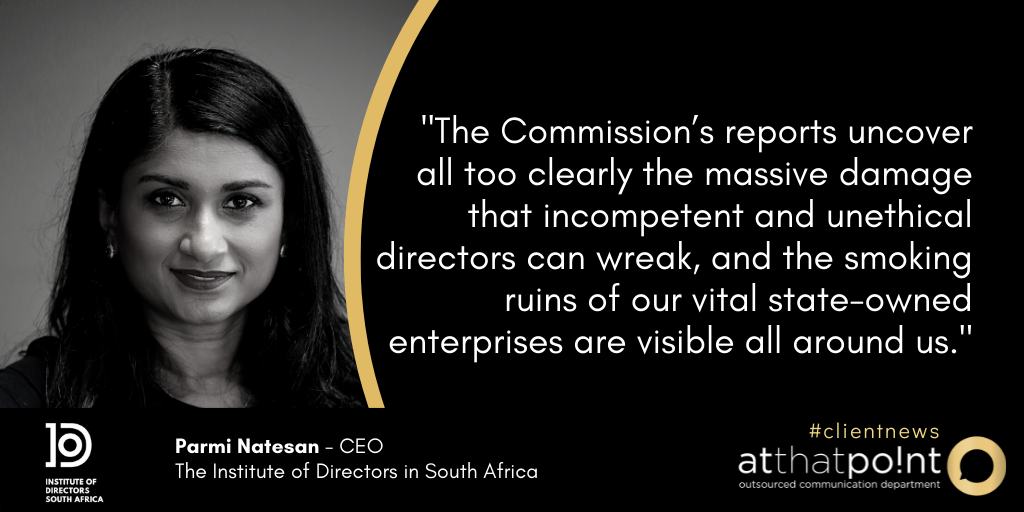 In its final report, the Judicial Commission of Inquiry into State Capture (Zondo Commission) recommends the enactment of legislation to establish a professional body for public procurement officials.[1] While there is no doubt this is a good move, the Institute of Directors in South Africa wishes to express its disappointment that its recommendation for a similar enforced body for directors was not acted on. “We wrote to the Commission in September 2021 setting out the compelling reasons to recommend the establishment of a statutory professional body for directors. By not doing so, we believe that the Commission missed a historic opportunity to alter fundamentally the governance landscape of the country for the better,” says Parmi Natesan, CEO: IoDSA. “The Commission’s reports uncover all too clearly the massive damage that incompetent and unethical directors can wreak, and the smoking ruins of our vital state-owned enterprises are visible all around us.” A mandatory professional body for directors would have the benefit of requiring that directors would have to keep their skills updated via a rigorous process of continuous professional development. The professional body would also be able to keep its members abreast of developments in governance best practice. Equally important, members of such a professional body would be bound by a code of conduct, in terms of which they could be rapidly disciplined and even have their membership terminated. Termination could in turn signal to the market to not appoint them as a director. “As we now contemplate the possibility of years of litigation to bring the main actors in state capture to book, establishing a mechanism through which unethical or incompetent directors could be swiftly and relatively inexpensively held to account looks very attractive,” she observes. The IoDSA further argues that alongside a statutory professional body for directors, there should be enforcement of formal director designations registered with the South African Qualifications Authority (SAQA). Such formal designations would provide a way to ensure that directors have the necessary competencies to serve as a director based on rigorous testing against a formal competency framework. Designation holders who fail to keep their skills updated in line with the CPD framework would have their designations removed, reducing their attractiveness to companies. The IoDSA already owns and awards two SAQA-recognised director designations—Certified Director (SA) and Chartered Director (SA). “Directorship is now a serious profession that requires individuals to possess a definite set of skills and competencies, and the ability to provide strong leadership based on sound ethical principles,” Ms Natesan concludes. “While this was not covered in the Commission’s final recommendations, the IoDSA will continue to lobby for directorship to become a regulated profession, providing both the public and private sectors with a growing pool of properly qualified individuals who have committed to ethical leadership and have signed on to a solid code of conduct.” ENDS MEDIA CONTACT: Stephné du Toit, [email protected], 084 587 9933, www.atthatpoint.co.za For more information on the IoDSA please visit: Website: www.iodsa.co.za Twitter: @The_IoDSA LinkedIn: Institute of Directors in South Africa Company Page Facebook: Institute of Directors South Africa [1] Judicial Commission of Inquiry into Allegations of Capture, Corruption and Fraud in the Public Sector Including Organs of State, Report: Part VI, Volume 4: Summary of Recommendations, 62, p24, available at www.statecapture.org.za/site/files/announcements/672/OCR_version_-_State_Capture_Commission_Report_Part_VI_Vol_IV_-_Recommendations.pdf. |
Archives
July 2024
Categories
All
|

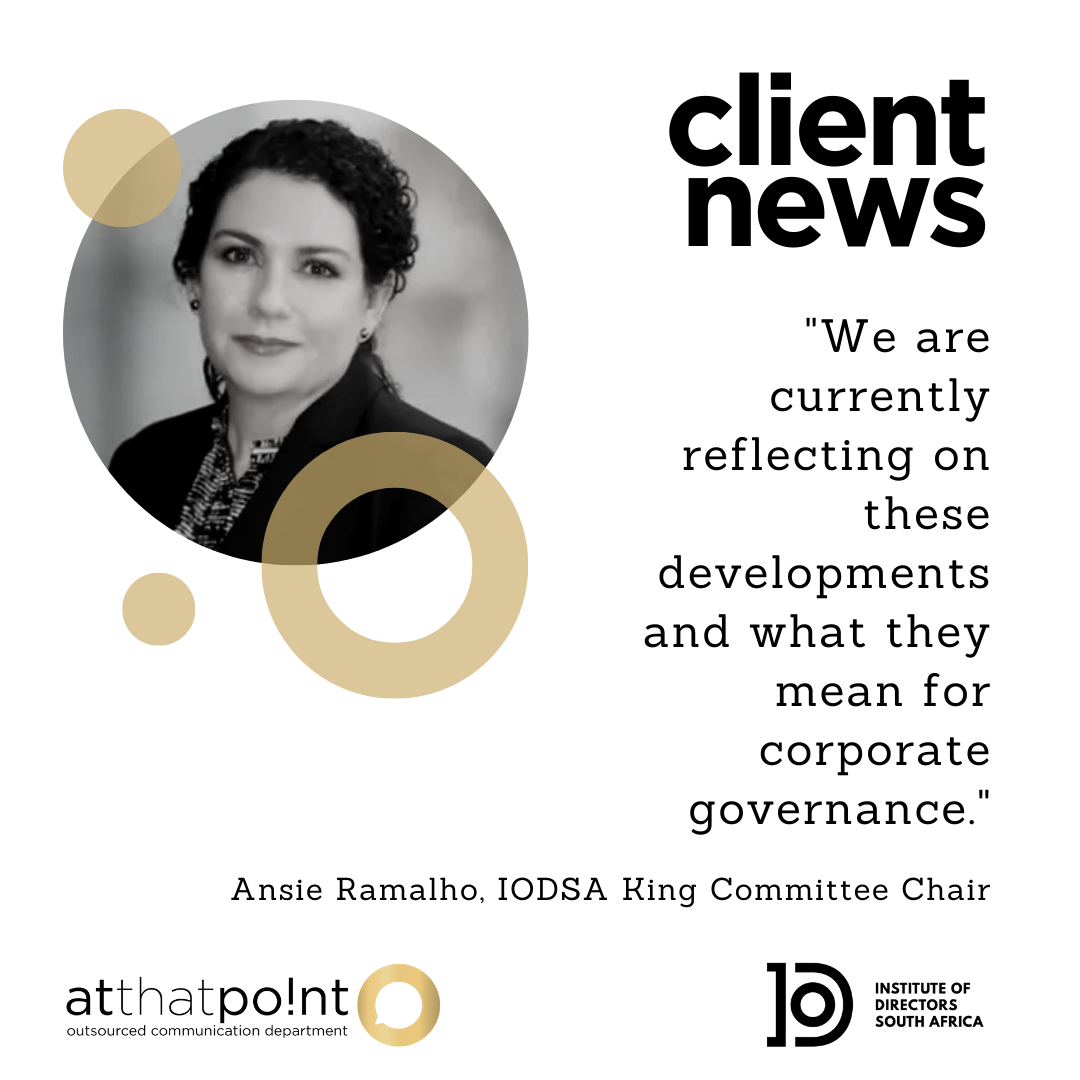
 RSS Feed
RSS Feed